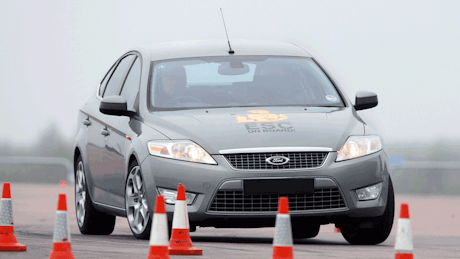What is ESC (Electronic Stability Control)?
February 03, 2022 by Ryan Hirons

Electronic Stability Control (often abbreviated to ESC) is a safety device that is almost certainly fitted to your car.
As the name suggests, it’s a system that electronically controls the stability of your car to help prevent skidding. How does it work though? This guide explains.
How ESC works
Different ESC systems will work in different ways, but generally speaking, they will automatically cut the engine’s power to prevent excessive skidding. Some will apply a car’s brakes if need be.
This works to maintain as much grip as possible in the event of a car skidding. This could be as a result of a slippery road surface or accelerating too hard, especially in tight corners.

Why do cars need ESC?
ESC is now a legal requirement, but it’s there to benefit you.
For example, on a particularly wet day, you could hit an unexpected puddle and find your car skidding across the road. An ESC system will detect a sudden loss of grip, and reduce power to help you regain control.
That said, it will never completely eliminate the risk of you losing control of your car. You must be vigilant and use your car’s throttle delicately in hazardous driving conditions.
Which cars have ESC?
ESC (sometimes known as ESP) has been a legal requirement for all cars sold in the European Union since 2014. This continues to apply to new cars sold in the UK post-Brexit as well.
Car manufacturers have used the tech long before that, however. These systems have been around since the ‘80s and gained traction (pun intended) in the early ‘00s. There’s a very good chance your car has some form of ESC, even if it’s quite old now.
FAQs: Electronic Stability Control (ESC)
Can I drive with ESC turned off?
Some cars will allow you to turn ESC systems off. This may be useful when driving slowly up steep hills in snowy conditions, though it’s best left on in most cases.
However, if you choose to turn it off, you should be incredibly careful. Without the system on, your car won’t have that extra layer of protection against skidding.
Some cars may also allow you to reduce how keenly their ESC systems react, particularly performance cars. A common term for this type of system is ‘ESC Sport’.
What does it mean when the ESC warning light comes on?
If you see the ESC warning light while driving, this shows the system is in use and a loss of traction has been detected.
It should only appear for a very short amount of time, though. If your ESC light stays on, it could be a fault with a sensor or the system.
Cars Change? Carwow!
Looking for a new set of wheels? With Carwow you can sell your car quickly and for a fair price – as well as find great offers on your next one. Whether you’re looking to buy a car brand new, are after something used or you want to explore car leasing options, Carwow is your one stop shop for new car deals.















